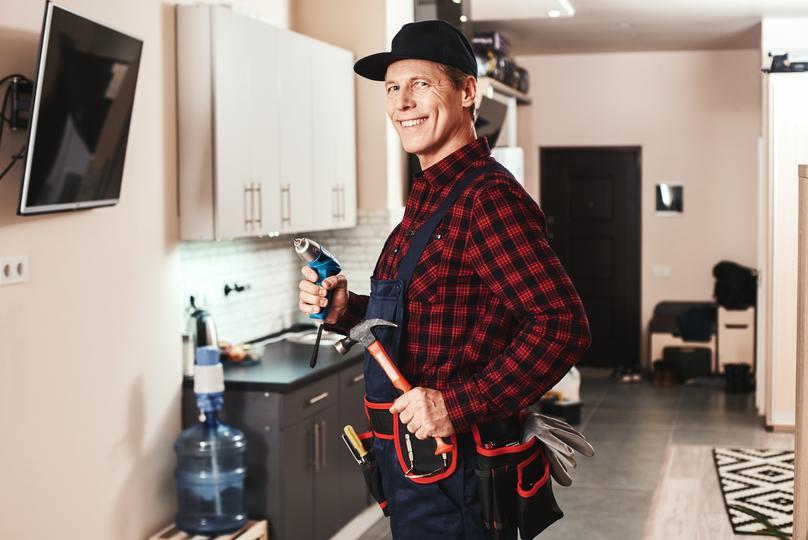Discover Premier Remodeling Companies - Get Your No-Obligation Quotes Today!
Get Quotes From Elite Remodeling Pros
Dive into a curated selection of remodeling companies, each vetted for excellence. Secure exclusive offers and embark on your renovation journey with confidence. From minor upgrades to comprehensive overhauls, find the perfect partner for your project.

Kickstart Your Remodeling Project
Leverage our platform to quickly compare and choose the best remodeling companies tailored to your unique needs and vision.
How it works?
Our process guarrantees that you always get afair and competitive quote. Say goodbye to overbilling!

- Submit an Enquiry Describing Your Project
- Begin by submitting an enquiry for your Remodeling needs on Remodelyng.com, ensuring that all relevant project specifics are covered to match you accurately with skilled contractors.
- Experts Match You With Qualified Contractors
- Our Remodelyng.com specialists will assess your project details and then invite the most experienced contractors, who have a proven track record of success on Remodeling projects, to submit a competitive quote for your consideration.
- Contractors Offer Their Best Quotes
- Selected companies, aware of the competition and keen to win your project, will put forward fair and competitive quotes, ensuring you get the best deal for your Remodeling project.
- Review, Compare, and Choose
- You'll receive these quotes along with access to the contractors' profiles, including reviews, insurance details, and license information. This comprehensive data allows you to make an informed decision, picking the contractor that best fits your project's requirements and budget, based on factual evidence rather than gut-feelings.
Why Choose Remodelyng.com?
At Remodelyng.com, we're committed to making your Remodeling journey seamless and rsik-free. From the first click to the completion of your project, our team is here to support you every step of the way.

- No Cost, No Obligation
- Submitting a project request on Remodelyng.com is absolutely free, and you're under no obligation to proceed. We understand the importance of exploring your options before making a decision.
- Multiple Quotes
- Receive up to 3 competitive quotes from our network of experienced contractors. We make it easy for you to compare options and ensure you're getting the best deal for your project.
- Best Price Guarantee
- Our platform is designed to help you always find the best price for essential home improvements. With a wide range of contractors, you're sure to get a great deal for high-quality work.
- Quality and Trust
- Choose from a selection of top-rated professionals vetted for quality and reliability. Our rigorous selection process ensures that you're matched with the best contractors who have a proven track record of success.
- Comprehensive Services
- From initial consultation to the final touches, Remodelyng.com offers a wide range of services to cover all aspects of your remodeling project. Whether it's a kitchen upgrade, bathroom renovation, or a full home remodel, we have the expertise to support your vision.
- Instant Booking & Convenience
- With Remodelyng.com, you can book your project instantly online. No more waiting for callbacks or dealing with multiple contractors. Our streamlined process saves you time and hassle, making home improvement projects as straightforward as possible.
Ultimate Guide for Working with Renovation Companies
Our guide is crafted to help you through each phase of your remodeling project, ensuring a seamless experience with professional renovation companies. Dive into our specialized checklists tailored for planning, hiring, pre-construction, and post-construction stages.
Step 1
Strategic Planning for Your Remodel
How Should I Start Planning My Remodel?
The first step in any successful remodel is strategic planning. This comprehensive approach helps you define your vision, budget, and timeline, setting the stage for a successful collaboration with a remodeling company.
- Vision and Goals
- Clarify your vision by identifying desired outcomes for your remodel, considering both aesthetic and functional improvements.
- Budgeting with Precision
- Craft a detailed budget that reflects your renovation goals, including a contingency fund for unforeseen expenses.
- Design Inspirations
- Gather inspiration from various sources like home design websites, to refine your aesthetic preferences.
- Functionality and Flow
- Consider the functionality and flow of your space. How can it be improved to better suit your needs?
- Timeline Planning
- Develop a realistic timeline for your project, considering each phase from planning to completion.
- Legal and Permitting Requirements
- Research the legal and permitting requirements for your project to ensure compliance with local building codes.
- Sustainability Considerations
- Integrate sustainability considerations into your remodel by selecting eco-friendly materials.
- Future-proofing
- Future-proof your home by considering advancements in home technology and incorporating flexible design elements.
- Selecting a Remodeling Company
- Begin researching and shortlisting potential renovation companies with solid reputations in projects similar to yours.
- Consultation and Quotes
- Schedule consultations with your shortlisted companies to discuss your project in detail and obtain comprehensive quotes.
Step 2
Selecting the Right Renovation Company
How Do I Choose the Best Renovation Company?
Choosing the right remodeling company is pivotal to the success of your project. This checklist guides you through the vetting process, ensuring you partner with a company that aligns with your vision and values.
- Reputation and References
- Evaluate the company’s reputation by reviewing online testimonials and requesting references from previous clients.
- Credentials and Certifications
- Verify the company's credentials, including insurance, to ensure they meet industry standards.
- Portfolio of Work
- Review the company’s portfolio to assess the quality of their work and their experience with projects of similar complexity to yours.
- Communication and Processes
- Assess the company's communication processes and project management approach to ensure they align with your expectations.
- Comparative Bidding
- Engage in comparative bidding by analyzing multiple quotes to understand cost breakdowns and ensure value for your investment.
- Contract Review
- Carefully review the contract, paying close attention to the scope of work, payment schedule, and any warranties or guarantees.
- Collaboration and Flexibility
- Discuss the company's willingness to collaborate and their flexibility in accommodating changes or addressing challenges during the project.
- Scheduling Compatibility
- Confirm the company’s availability aligns with your project timeline, ensuring they can start and complete the work according to your schedule.
- Finalizing the Selection
- After thorough evaluation, finalize your selection of the renovation company that best meets your project’s needs and expectations.
- Preparation for Kick-off
- Work closely with the selected company to finalize the details and prepare for the project kick-off, setting clear expectations for each phase of the remodel.
Step 3
Pre-construction Readiness
How Do I Prepare for the Construction Phase?
Proper preparation before the construction begins can significantly impact the efficiency and success of the project. This checklist covers essential steps to ensure you, and the remodeling company are fully prepared.
- Final Design Approval
- Confirm the final design and specifications with the remodeling company, ensuring all details are agreed upon before construction starts.
- Permit Acquisition
- Ensure all necessary permits have been acquired to comply with local regulations and avoid any legal complications.
- Site Preparation
- Prepare the site for construction by clearing the area, securing valuables, and setting up any necessary protection for unaffected areas.
- Material and Equipment Logistics
- Coordinate with the remodeling company on the logistics for materials and equipment, ensuring timely availability and storage solutions.
- Safety Protocols
- Review and agree on safety protocols with the renovation company to ensure a safe environment for both workers and occupants.
- Neighbor Notification
- Inform your neighbors about the upcoming construction to manage expectations and maintain good relationships.
- Temporary Arrangements
- Make any necessary temporary arrangements for living, especially if the remodel requires significant portions of your home to be inaccessible.
- Communication Plan
- Establish a clear communication plan with the remodeling company, including regular updates and points of contact.
- Contingency Plans
- Discuss and plan for potential contingencies with the renovation company to address any unforeseen challenges during the construction phase.
- Project Kick-off Meeting
- Schedule a project kick-off meeting with the renovation company to review the project plan, timelines, and expectations before construction begins.
Step 4
Post-construction Wrap-up
What Should Be Done After Construction Ends?
The completion of construction marks a critical phase where attention to detail ensures that everything has been completed to your satisfaction. This checklist helps you navigate the final steps to wrap up the project.
- Final Walkthrough
- Conduct a final walkthrough with the remodeling company to ensure all aspects of the project meet your expectations and any deficiencies are noted.
- Punch List Completion
- Work with the remodeling company to address and complete any items on the punch list promptly.
- Final Payment
- Process the final payment once all work is completed to your satisfaction and any punch list items have been addressed.
- Warranty and Maintenance Information
- Collect all warranty information and maintenance guidelines for materials and workmanship provided by the remodeling company.
- Document Organization
- Organize and safely store all project-related documents, including contracts, permits, warranties, and maintenance guides.
- Post-Project Review
- Conduct a post-project review with the renovation company to provide feedback and discuss any lessons learned for future projects.
- Updating Home Insurance
- Update your home insurance policy to reflect the improvements made during the remodel, ensuring adequate coverage.
- Enjoy Your Remodeled Space
- Celebrate the completion of your remodel and enjoy your newly transformed space, reflecting on the successful collaboration with your remodeling company.
- Leave a Review
- Consider leaving a review for the remodeling company, sharing your experience to assist future clients in making informed decisions.
- Plan for Future Projects
- Reflect on the process and outcome of your project to identify any future remodeling needs or desires, using the insights gained for better planning and execution.
Remodeling Ideas
Need Some Inspiration?
Explore our gallery showcasing a variety of trendy and upscale Remodeling options, curated to assist you in making informed design decisions.
How much does Remodeling costs?
More than a marketplace
We Are Your Closest Ally
Our hand-picked 5-stars pros are absolutely determined to make a Remodeling project succeed. Our only question, will it be yours?
Top services from reliable contractors
More Renovation Services
Remodelyng.com exists to connect you to the right remodeling pro, first time and every time, whatever the remodeling project.
Transform your kitchen into a masterpiece with top-rated remodeling companies. Discover custom designs, luxury finishes, and smart kitchen solutions.
Upgrade your bathroom with the best in the business. Explore spa-like renovations, eco-friendly fixtures, and modern design solutions.
Expand your living space with premium home addition services. From extra bedrooms to sunrooms, get custom solutions tailored to your needs.
Transform your entire home with our comprehensive renovation services. From design to execution, experience seamless integration of style and functionality.
Elevate your home’s curb appeal with our exterior remodeling services. From siding and windows to roofing, create a lasting first impression.
Create your perfect outdoor living space with our deck and patio construction services. Tailored designs meet exceptional craftsmanship.
Maximize your home’s potential with our basement finishing and remodeling services. Turn unused space into your new favorite place.
Embrace sustainability with our energy-efficient remodeling services. From solar panels to green materials, enhance your home’s efficiency and comfort.
Upgrade your living with smart home automation. Control lighting, security, and entertainment systems seamlessly for enhanced comfort and convenience.
Ensure your home meets your needs at any age with our aging-in-place modifications. From grab bars to walk-in tubs, prioritize safety and accessibility.
Add a personal touch to your home with custom carpentry and built-ins. From bookshelves to closets, get bespoke solutions that fit your style and needs.
Elevate your home with our flooring installation services. Choose from high-end hardwood, marble, or custom tiles to create a stunning foundation for your space.
Preserve the past and embrace the future with our historic home renovation services. Specializing in revitalizing heritage homes with a touch of modern convenien
Enhance your outdoor living space with our professional hardscaping services. From patios to walkways, our expert team creates beautiful, durable outdoor areas.
Ensure your home is safe and secure with our high-tech security systems installation services. From advanced surveillance to smart locks, enjoy peace of mind wit
Enhance your home’s energy efficiency and aesthetic appeal with our window and door replacement services. Choose from a wide range of stylish and durable options
Illuminate your home with custom lighting solutions that blend functionality and design. From LED upgrades to automated lighting systems, light up your space you
Create the ultimate entertainment space with our home theater installation services. Experience cinema-quality sound and visuals in the comfort of your home.
Enhance your outdoor living spaces with our outdoor lighting and electrical system services. From garden lights to integrated outdoor entertainment systems, make
Transform your outdoor space into a serene oasis with our custom water feature installations. From fountains to koi ponds, add a touch of tranquility to your hom
Achieve the perfect indoor environment with our advanced climate control systems. Enjoy tailored temperature and humidity settings for ultimate comfort all year
Enhance your home’s energy efficiency with our eco-friendly insulation solutions. From spray foam to sustainable materials, reduce your carbon footprint while sa
Ensure your home is protected with our roof replacement and repair services. From leak repairs to complete roof overhauls, our experts deliver quality workmanshi
Maximize your home’s potential by transforming your attic into a functional living space. Whether it’s a new bedroom, office, or playroom, our attic remodeling s
Create the ultimate outdoor living experience with our custom design and construction services. From kitchens to fire pits, enjoy your outdoor space to the fulle
Make your home accessible for everyone with our handicap remodeling services. From ramps to accessible bathrooms, we ensure your space meets ADA standards.
Create a productive and stylish home office space with our remodeling services. From ergonomic designs to custom storage, work from home in comfort and style.
Add value and functionality to your home with a custom pool house. Perfect for entertaining, changing, or simply relaxing by the poolside.
Transform your garage into more than just a place for parking. Our garage remodeling services can turn it into a workshop, gym, or additional living space, tailo
Looking for a reliable Remodeling pro?
Get your project done right the first time!
No Remodeling job is too big or too small.
We will send you up to 3 fair and competitive quotes!
Have more questions? We can help.
Reach out to our team by sending us an email and we’ll get back to you ASAP.
What is home remodeling?
Home remodeling involves changing or improving your home through renovations, alterations, or additions. It can encompass a range of projects, such as:
- Kitchen & Bathroom Updates: Modernizing kitchens and bathrooms with new cabinets, countertops, and appliances.
- Interior Renovations: Redesigning bedrooms, living rooms, basements, or attics with new finishes, layouts, and features.
- Room Additions: Expanding your home's square footage by adding new rooms like bedrooms, offices, or sunrooms.
- Exterior Improvements: Boosting curb appeal with new siding, windows, doors, or landscaping.
- Energy-Efficiency Upgrades: Improving comfort and reducing energy bills with upgraded insulation, new windows, or efficient HVAC systems.
What are the benefits of home remodeling?
Home remodeling offers homeowners numerous benefits, including:
- Increased Home Value: Strategic renovations can significantly boost your home's resale value.
- Improved Functionality: Transform your home to better fit your lifestyle needs and preferences.
- Enhanced Comfort: Create a more enjoyable living space with updates that prioritize comfort and well-being.
- Enhanced Aesthetics: Elevate your home's style and beauty with modern finishes and design trends.
- Increased Energy Efficiency: Lower your energy bills and carbon footprint with energy-saving upgrades.
How much does it cost to remodel a home?
Home remodeling costs vary widely depending on several factors, including:
- Scope of the Project: Whether it's a simple update or a major whole-home renovation.
- Size of Home: Larger homes naturally require more materials and labor.
- Materials & Finishes: Your selection of finishes, fixtures, and appliances significantly impacts the budget.
- Contractor Fees: Labor costs and contractor rates vary based on your location and project complexity.
- Unexpected Issues: Potential costs may arise if unforeseen problems are discovered during the remodel.
Speak to experienced remodeling contractors for detailed estimates tailored to your project.
How long does a home remodeling project take?
The duration of a home remodel hinges on various factors, including:
- Scope & Complexity: Large-scale whole-home remodels or complex projects naturally take longer to complete.
- Type of Project: Kitchen and bathroom remodels generally involve more extensive work and require more time than single-room updates.
- Material Availability: Delays can occur if specialty materials or custom fixtures have long lead times.
- Contractor's Schedule: Highly sought-after contractors may have limited availability, affecting your project's timeline.
- Unexpected Issues: Unforeseen problems uncovered during the project can lengthen the renovation duration.
Speak to your remodeling contractor for a realistic timeline estimate specific to your project.
How do I plan a home remodel?
Careful planning is essential for a successful home remodeling project. Follow these steps:
- Define Your Goals: Clearly establish what you hope to achieve with your remodel, whether to boost functionality, enhance aesthetics, or increase home value.
- Set a Realistic Budget: Determine how much you can comfortably afford to spend and include a contingency for potential unexpected costs.
- Gather Inspiration: Browse magazines, websites, and platforms like Pinterest to develop an idea of your desired styles and features.
- Consider Your Needs: Design changes that support your current lifestyle and anticipate future requirements.
- Find a Reputable Contractor: Research and choose a licensed and experienced contractor who specializes in your type of project.
How do I find the best contractor for my home remodel?
Selecting the right contractor ensures a smooth and successful project. Focus on finding those who:
- Have Relevant Experience: Possess demonstrated experience in the specific types of remodeling projects you envision.
- Showcase a Portfolio: Exhibit a portfolio of completed work that aligns with your desired style and project scope.
- Are Licensed & Insured: Hold all necessary licenses and adequate insurance coverage for your protection.
- Provide Positive References: Have excellent reviews and testimonials from past clients.
- Communicate Well: Clearly explain the remodeling process, provide detailed estimates, and promptly address your questions and concerns.
Start your search on Remodelyng.com to find qualified remodeling contractors in your area.
Do I need permits for my home remodel?
Most home remodeling projects require permits from your local building department. Permits are typically necessary if you're:
- Making Structural Changes: Modifying load-bearing walls, adding rooms, or affecting structural elements of your house.
- Updating Electrical: Adding new circuits, outlets, rewiring, or upgrading electrical panels.
- Upgrading Plumbing: Installing new plumbing fixtures, changing existing plumbing configurations, or extending gas lines.
- Installing HVAC: Adding or replacing heating and cooling systems or ductwork.
- Compliance & Safety: Projects subject to specific building codes aimed at ensuring your home's safety and compliance.
Always consult your local building department for the specific permit requirements in your area, as regulations may vary.
What are some popular home remodeling trends?
Transform your home with these in-demand remodeling trends:
- Open Floor Plans: Creating airy, connected spaces between the kitchen, living, and dining areas.
- Multifunctional Spaces: Designing rooms that serve multiple purposes, to maximize space efficiency.
- Smart Home Technology: Incorporating home automation for lighting, climate control, entertainment, and security.
- Natural Materials: Using stone, wood, and other organic textures to create a connection to nature.
- Focus on Wellness: Adding home gyms, spa-like bathrooms, and dedicated spaces for relaxation and self-care.
- Energy Efficiency: Prioritizing eco-friendly upgrades like solar panels, energy-efficient appliances, and high-performance insulation.
How can I create a more sustainable home remodel?
Prioritize eco-conscious choices during your remodel with these strategies:
- Energy-Efficient Upgrades: Opt for high-performance windows, LED lighting, smart thermostats, and energy-efficient appliances.
- Sustainable Materials: Choose eco-friendly materials like bamboo, reclaimed wood, and natural stone.
- Water Conservation: Install low-flow showerheads, faucets, and water-efficient toilets.
- Repurpose & Reuse: Salvage existing materials when possible and repurpose or donate old fixtures instead of discarding them.
- Natural Light: Maximize natural light to reduce reliance on artificial lighting.
- Solar Power: Consider integrating solar panels to reduce your reliance on non-renewable energy sources.
What are some tips for staying on budget during a home remodel?
Keep your remodel costs in check with these strategies:
- Set a Realistic Budget: Establish a clear budget upfront, with a 10-15% contingency for unexpected expenses.
- Prioritize Your Needs: Identify must-have features and prioritize them over optional upgrades if funding becomes tight.
- Compare Costs: Get multiple quotes from different contractors and compare prices for materials and fixtures.
- Shop Around: Look for deals on materials, fixtures, and appliances at salvage yards, discount stores, or during sales.
- Consider DIY: If feasible, handle certain tasks yourself, like painting or demolition, to reduce labor costs.
- Track Expenses: Keep detailed records of all project costs to monitor your spending and stay within budget.
Where to find good remodeling contractors?
Find reliable professionals to bring your remodeling dreams to life using these resources:
- Referrals: Ask friends, neighbors, or realtors for recommendations based on recent successful remodeling projects.
- Online Reviews & Ratings: Investigate contractor reputations on reputable review platforms and contractor listing sites.
- Online Marketplaces: Remodelyng.com lets you find compare reviews .
What are the best remodeling contractors near me?
The 'best' contractor depends on your specific project requirements and location. Look for those who:
- Specialize in Your Project: Have demonstrable expertise and experience in the type of remodel you're planning.
- Showcase a Portfolio: Have a collection of completed projects showcasing quality workmanship and matching your desired style.
- Possess Necessary Licenses: Hold valid licenses and insurance required in your jurisdiction.
- Communicate Clearly: Provide detailed quotes, readily explain the remodeling process, and promptly address your questions.
- Offer Positive References: Have glowing reviews from past clients, confirming professionalism and high-quality results.
Start your search on Remodelyng.com to find top-rated remodeling experts in your area.
What is home remodeling?
Home remodeling involves changing or improving your home through renovations, alterations, or additions. It can encompass a range of projects, such as:
- Kitchen & Bathroom Updates: Modernizing kitchens and bathrooms with new cabinets, countertops, and appliances.
- Interior Renovations: Redesigning bedrooms, living rooms, basements, or attics with new finishes, layouts, and features.
- Room Additions: Expanding your home's square footage by adding new rooms like bedrooms, offices, or sunrooms.
- Exterior Improvements: Boosting curb appeal with new siding, windows, doors, or landscaping.
- Energy-Efficiency Upgrades: Improving comfort and reducing energy bills with upgraded insulation, new windows, or efficient HVAC systems.
What are the benefits of home remodeling?
Home remodeling offers homeowners numerous benefits, including:
- Increased Home Value: Strategic renovations can significantly boost your home's resale value.
- Improved Functionality: Transform your home to better fit your lifestyle needs and preferences.
- Enhanced Comfort: Create a more enjoyable living space with updates that prioritize comfort and well-being.
- Enhanced Aesthetics: Elevate your home's style and beauty with modern finishes and design trends.
- Increased Energy Efficiency: Lower your energy bills and carbon footprint with energy-saving upgrades.
How much does it cost to remodel a home?
Home remodeling costs vary widely depending on several factors, including:
- Scope of the Project: Whether it's a simple update or a major whole-home renovation.
- Size of Home: Larger homes naturally require more materials and labor.
- Materials & Finishes: Your selection of finishes, fixtures, and appliances significantly impacts the budget.
- Contractor Fees: Labor costs and contractor rates vary based on your location and project complexity.
- Unexpected Issues: Potential costs may arise if unforeseen problems are discovered during the remodel.
Speak to experienced remodeling contractors for detailed estimates tailored to your project.
How long does a home remodeling project take?
The duration of a home remodel hinges on various factors, including:
- Scope & Complexity: Large-scale whole-home remodels or complex projects naturally take longer to complete.
- Type of Project: Kitchen and bathroom remodels generally involve more extensive work and require more time than single-room updates.
- Material Availability: Delays can occur if specialty materials or custom fixtures have long lead times.
- Contractor's Schedule: Highly sought-after contractors may have limited availability, affecting your project's timeline.
- Unexpected Issues: Unforeseen problems uncovered during the project can lengthen the renovation duration.
Speak to your remodeling contractor for a realistic timeline estimate specific to your project.
How do I plan a home remodel?
Careful planning is essential for a successful home remodeling project. Follow these steps:
- Define Your Goals: Clearly establish what you hope to achieve with your remodel, whether to boost functionality, enhance aesthetics, or increase home value.
- Set a Realistic Budget: Determine how much you can comfortably afford to spend and include a contingency for potential unexpected costs.
- Gather Inspiration: Browse magazines, websites, and platforms like Pinterest to develop an idea of your desired styles and features.
- Consider Your Needs: Design changes that support your current lifestyle and anticipate future requirements.
- Find a Reputable Contractor: Research and choose a licensed and experienced contractor who specializes in your type of project.
How do I find the best contractor for my home remodel?
Selecting the right contractor ensures a smooth and successful project. Focus on finding those who:
- Have Relevant Experience: Possess demonstrated experience in the specific types of remodeling projects you envision.
- Showcase a Portfolio: Exhibit a portfolio of completed work that aligns with your desired style and project scope.
- Are Licensed & Insured: Hold all necessary licenses and adequate insurance coverage for your protection.
- Provide Positive References: Have excellent reviews and testimonials from past clients.
- Communicate Well: Clearly explain the remodeling process, provide detailed estimates, and promptly address your questions and concerns.
Start your search on Remodelyng.com to find qualified remodeling contractors in your area.
Do I need permits for my home remodel?
Most home remodeling projects require permits from your local building department. Permits are typically necessary if you're:
- Making Structural Changes: Modifying load-bearing walls, adding rooms, or affecting structural elements of your house.
- Updating Electrical: Adding new circuits, outlets, rewiring, or upgrading electrical panels.
- Upgrading Plumbing: Installing new plumbing fixtures, changing existing plumbing configurations, or extending gas lines.
- Installing HVAC: Adding or replacing heating and cooling systems or ductwork.
- Compliance & Safety: Projects subject to specific building codes aimed at ensuring your home's safety and compliance.
Always consult your local building department for the specific permit requirements in your area, as regulations may vary.
What are some popular home remodeling trends?
Transform your home with these in-demand remodeling trends:
- Open Floor Plans: Creating airy, connected spaces between the kitchen, living, and dining areas.
- Multifunctional Spaces: Designing rooms that serve multiple purposes, to maximize space efficiency.
- Smart Home Technology: Incorporating home automation for lighting, climate control, entertainment, and security.
- Natural Materials: Using stone, wood, and other organic textures to create a connection to nature.
- Focus on Wellness: Adding home gyms, spa-like bathrooms, and dedicated spaces for relaxation and self-care.
- Energy Efficiency: Prioritizing eco-friendly upgrades like solar panels, energy-efficient appliances, and high-performance insulation.
How can I create a more sustainable home remodel?
Prioritize eco-conscious choices during your remodel with these strategies:
- Energy-Efficient Upgrades: Opt for high-performance windows, LED lighting, smart thermostats, and energy-efficient appliances.
- Sustainable Materials: Choose eco-friendly materials like bamboo, reclaimed wood, and natural stone.
- Water Conservation: Install low-flow showerheads, faucets, and water-efficient toilets.
- Repurpose & Reuse: Salvage existing materials when possible and repurpose or donate old fixtures instead of discarding them.
- Natural Light: Maximize natural light to reduce reliance on artificial lighting.
- Solar Power: Consider integrating solar panels to reduce your reliance on non-renewable energy sources.
What are some tips for staying on budget during a home remodel?
Keep your remodel costs in check with these strategies:
- Set a Realistic Budget: Establish a clear budget upfront, with a 10-15% contingency for unexpected expenses.
- Prioritize Your Needs: Identify must-have features and prioritize them over optional upgrades if funding becomes tight.
- Compare Costs: Get multiple quotes from different contractors and compare prices for materials and fixtures.
- Shop Around: Look for deals on materials, fixtures, and appliances at salvage yards, discount stores, or during sales.
- Consider DIY: If feasible, handle certain tasks yourself, like painting or demolition, to reduce labor costs.
- Track Expenses: Keep detailed records of all project costs to monitor your spending and stay within budget.
Where to find good remodeling contractors?
Find reliable professionals to bring your remodeling dreams to life using these resources:
- Referrals: Ask friends, neighbors, or realtors for recommendations based on recent successful remodeling projects.
- Online Reviews & Ratings: Investigate contractor reputations on reputable review platforms and contractor listing sites.
- Online Marketplaces: Remodelyng.com lets you find compare reviews .
What are the best remodeling contractors near me?
The 'best' contractor depends on your specific project requirements and location. Look for those who:
- Specialize in Your Project: Have demonstrable expertise and experience in the type of remodel you're planning.
- Showcase a Portfolio: Have a collection of completed projects showcasing quality workmanship and matching your desired style.
- Possess Necessary Licenses: Hold valid licenses and insurance required in your jurisdiction.
- Communicate Clearly: Provide detailed quotes, readily explain the remodeling process, and promptly address your questions.
- Offer Positive References: Have glowing reviews from past clients, confirming professionalism and high-quality results.
Start your search on Remodelyng.com to find top-rated remodeling experts in your area.








